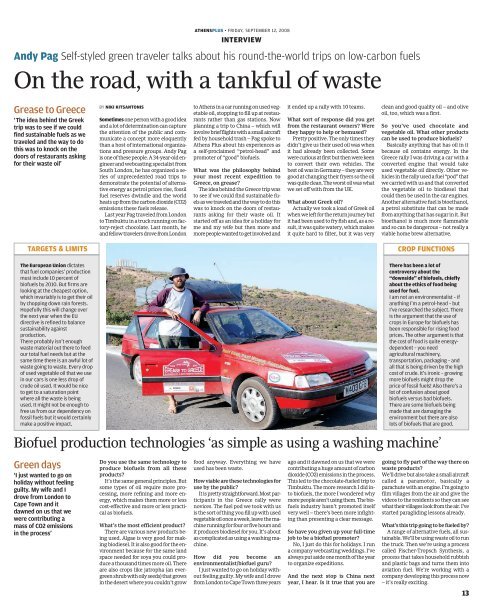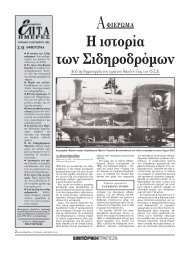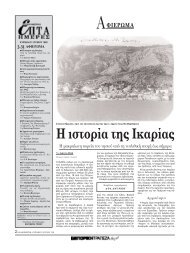Lawlessness threatens to turn heart of Athens into no-go zone
Lawlessness threatens to turn heart of Athens into no-go zone
Lawlessness threatens to turn heart of Athens into no-go zone
Create successful ePaper yourself
Turn your PDF publications into a flip-book with our unique Google optimized e-Paper software.
Do you use the same tech<strong>no</strong>logy <strong>to</strong><br />
produce bi<strong>of</strong>uels from all these<br />
products?<br />
It’s the same general principles. But<br />
some types <strong>of</strong> oil require more processing,<br />
more refining and more energy,<br />
which makes them more or less<br />
cost-effective and more or less practical<br />
as bi<strong>of</strong>uels.<br />
What’s the most efficient product?<br />
There are various new products being<br />
used. Algae is very <strong>go</strong>od for making<br />
biodiesel. It is also <strong>go</strong>od for the environment<br />
because for the same land<br />
space needed for soya you could produce<br />
a thousand times more oil. There<br />
are also crops like jatropha (an evergreen<br />
shrub with oily seeds) that grows<br />
in the desert where you couldn’t grow<br />
ATHENSPLUS • FRIDAY, SEPTEMBER 12, 2008<br />
INTERVIEW<br />
Andy Pag Self-styled green traveler talks about his round-the-world trips on low-carbon fuels<br />
On the road, with a tankful <strong>of</strong> waste<br />
Grease <strong>to</strong> Greece<br />
‘The idea behind the Greek<br />
trip was <strong>to</strong> see if we could<br />
find sustainable fuels as we<br />
traveled and the way <strong>to</strong> do<br />
this was <strong>to</strong> k<strong>no</strong>ck on the<br />
doors <strong>of</strong> restaurants asking<br />
for their waste oil’<br />
Green days<br />
‘I just wanted <strong>to</strong> <strong>go</strong> on<br />
holiday without feeling<br />
guilty. My wife and I<br />
drove from London <strong>to</strong><br />
Cape Town and it<br />
dawned on us that we<br />
were contributing a<br />
mass <strong>of</strong> CO2 emissions<br />
in the process’<br />
BY NIKI KITSANTONIS<br />
Sometimes one person with a <strong>go</strong>od idea<br />
and a lot <strong>of</strong> determination can capture<br />
the attention <strong>of</strong> the public and communicate<br />
a concept more eloquently<br />
than a host <strong>of</strong> international organizations<br />
and pressure groups. Andy Pag<br />
is one <strong>of</strong> these people. A 34-year-old engineer<br />
and webcasting specialist from<br />
South London, he has organized a series<br />
<strong>of</strong> unprecedented road trips <strong>to</strong><br />
demonstrate the potential <strong>of</strong> alternative<br />
energy as petrol prices rise, fossil<br />
fuel reserves dwindle and the world<br />
heats up from the carbon dioxide (CO2)<br />
emissions these fuels release.<br />
Last year Pag traveled from London<br />
<strong>to</strong> Timbuktu in a truck running on fac<strong>to</strong>ry-reject<br />
chocolate. Last month, he<br />
and fellow travelers drove from London<br />
<strong>to</strong> <strong>Athens</strong> in a car running on used vegetable<br />
oil, s<strong>to</strong>pping <strong>to</strong> fill up at restaurants<br />
rather than gas stations. Now<br />
planning a trip <strong>to</strong> China – which will<br />
involve brief flights with a small aircraft<br />
fed by household trash – Pag spoke <strong>to</strong><br />
<strong>Athens</strong> Plus about his experiences as<br />
a self-proclaimed “petrol-head” and<br />
promoter <strong>of</strong> “<strong>go</strong>od” bi<strong>of</strong>uels.<br />
What was the philosophy behind<br />
your most recent expedition <strong>to</strong><br />
Greece, on grease?<br />
The idea behind the Greece trip was<br />
<strong>to</strong> see if we could find sustainable fuels<br />
as we traveled and the way <strong>to</strong> do this<br />
was <strong>to</strong> k<strong>no</strong>ck on the doors <strong>of</strong> restaurants<br />
asking for their waste oil. It<br />
started <strong>of</strong>f as an idea for a holiday for<br />
me and my wife but then more and<br />
more people wanted <strong>to</strong> get involved and<br />
Bi<strong>of</strong>uel production tech<strong>no</strong>logies ‘as simple as using a washing machine’<br />
food anyway. Everything we have<br />
used has been waste.<br />
How viable are these tech<strong>no</strong>logies for<br />
use by the public?<br />
It is pretty straightforward. Most participants<br />
in the Greece rally were<br />
<strong>no</strong>vices. The fuel pod we <strong>to</strong>ok with us<br />
is the sort <strong>of</strong> thing you fill up with used<br />
vegetable oil once a week, leave the machine<br />
running for four or five hours and<br />
it produces biodiesel for you. It’s about<br />
as complicated as using a washing machine.<br />
How did you become an<br />
environmentalist/bi<strong>of</strong>uel guru?<br />
I just wanted <strong>to</strong> <strong>go</strong> on holiday without<br />
feeling guilty. My wife and I drove<br />
from London <strong>to</strong> Cape Town three years<br />
it ended up a rally with 10 teams.<br />
What sort <strong>of</strong> response did you get<br />
from the restaurant owners? Were<br />
they happy <strong>to</strong> help or bemused?<br />
Pretty positive. The only times they<br />
didn’t give us their used oil was when<br />
it had already been collected. Some<br />
were curious at first but then were keen<br />
<strong>to</strong> convert their own vehicles. The<br />
best oil was in Germany – they are very<br />
<strong>go</strong>od at changing their fryers so the oil<br />
was quite clean. The worst oil was what<br />
we set <strong>of</strong>f with from the UK.<br />
What about Greek oil?<br />
Actually we <strong>to</strong>ok a load <strong>of</strong> Greek oil<br />
when we left for the re<strong>turn</strong> journey but<br />
it had been used <strong>to</strong> fry fish and, as a result,<br />
it was quite watery, which makes<br />
it quite hard <strong>to</strong> filter, but it was very<br />
a<strong>go</strong> and it dawned on us that we were<br />
contributing a huge amount <strong>of</strong> carbon<br />
dioxide (CO2) emissions in the process.<br />
This led <strong>to</strong> the chocolate-fueled trip <strong>to</strong><br />
Timbuktu. The more research I did in<strong>to</strong><br />
bi<strong>of</strong>uels, the more I wondered why<br />
more people aren’t using them. The bi<strong>of</strong>uels<br />
industry hasn’t promoted itself<br />
very well – there’s been more infighting<br />
than presenting a clear message.<br />
So have you given up your full-time<br />
job <strong>to</strong> be a bi<strong>of</strong>uel promoter?<br />
No, I just do this for holidays. I run<br />
a company webcasting weddings. I’ve<br />
always put aside one month <strong>of</strong> the year<br />
<strong>to</strong> organize expeditions.<br />
And the next s<strong>to</strong>p is China next<br />
year, I hear. Is it true that you are<br />
clean and <strong>go</strong>od quality oil – and olive<br />
oil, <strong>to</strong>o, which was a first.<br />
So you’ve used chocolate and<br />
vegetable oil. What other products<br />
can be used <strong>to</strong> produce bi<strong>of</strong>uels?<br />
Basically anything that has oil in it<br />
because oil contains energy. In the<br />
Greece rally I was driving a car with a<br />
converted engine that would take<br />
used vegetable oil directly. Other vehicles<br />
in the rally used a fuel “pod” that<br />
we carried with us and that converted<br />
the vegetable oil <strong>to</strong> biodiesel that<br />
could then be used in the car engines.<br />
A<strong>no</strong>ther alternative fuel is bioetha<strong>no</strong>l,<br />
a petrol substitute that can be made<br />
from anything that has sugar in it. But<br />
bioetha<strong>no</strong>l is much more flammable<br />
and so can be dangerous – <strong>no</strong>t really a<br />
viable home brew alternative.<br />
TARGETS & LIMITS CROP FUNCTIONS<br />
The European Union dictates<br />
that fuel companies’ production<br />
must include 10 percent <strong>of</strong><br />
bi<strong>of</strong>uels by 2010. But firms are<br />
looking at the cheapest option,<br />
which invariably is <strong>to</strong> get their oil<br />
by chopping down rain forests.<br />
Hopefully this will change over<br />
the next year when the EU<br />
directive is refined <strong>to</strong> balance<br />
sustainability against<br />
production.<br />
There probably isn’t e<strong>no</strong>ugh<br />
waste material out there <strong>to</strong> feed<br />
our <strong>to</strong>tal fuel needs but at the<br />
same time there is an awful lot <strong>of</strong><br />
waste <strong>go</strong>ing <strong>to</strong> waste. Every drop<br />
<strong>of</strong> used vegetable oil that we use<br />
in our cars is one less drop <strong>of</strong><br />
crude oil used. It would be nice<br />
<strong>to</strong> get <strong>to</strong> a saturation point<br />
where all the waste is being<br />
used. It might <strong>no</strong>t be e<strong>no</strong>ugh <strong>to</strong><br />
free us from our dependency on<br />
fossil fuels but it would certainly<br />
make a positive impact.<br />
There has been a lot <strong>of</strong><br />
controversy about the<br />
“downside” <strong>of</strong> bi<strong>of</strong>uels, chiefly<br />
about the ethics <strong>of</strong> food being<br />
used for fuel.<br />
I am <strong>no</strong>t an environmentalist – if<br />
anything I’m a petrol-head – but<br />
I’ve researched the subject. There<br />
is the argument that the use <strong>of</strong><br />
crops in Europe for bi<strong>of</strong>uels has<br />
been responsible for rising food<br />
prices. The other argument is that<br />
the cost <strong>of</strong> food is quite energydependent<br />
– you need<br />
agricultural machinery,<br />
transportation, packaging – and<br />
all that is being driven by the high<br />
cost <strong>of</strong> crude. It’s ironic – growing<br />
more bi<strong>of</strong>uels might drop the<br />
price <strong>of</strong> fossil fuels! Also there’s a<br />
lot <strong>of</strong> confusion about <strong>go</strong>od<br />
bi<strong>of</strong>uels versus bad bi<strong>of</strong>uels.<br />
There are some bi<strong>of</strong>uels being<br />
made that are damaging the<br />
environment but there are also<br />
lots <strong>of</strong> bi<strong>of</strong>uels that are <strong>go</strong>od.<br />
<strong>go</strong>ing <strong>to</strong> fly part <strong>of</strong> the way there on<br />
waste products?<br />
We’ll drive but also take a small aircraft<br />
called a paramo<strong>to</strong>r, basically a<br />
parachute with an engine. I’m <strong>go</strong>ing <strong>to</strong><br />
film villages from the air and give the<br />
videos <strong>to</strong> the residents so they can see<br />
what their villages look from the air. I’ve<br />
started paragliding lessons already.<br />
What’s this trip <strong>go</strong>ing <strong>to</strong> be fueled by?<br />
A range <strong>of</strong> alternative fuels, all sustainable.<br />
We’ll be using waste oil <strong>to</strong> run<br />
the truck. Then we’re using a process<br />
called Fischer-Tropsch Synthesis, a<br />
process that takes household rubbish<br />
and plastic bags and <strong>turn</strong>s them in<strong>to</strong><br />
aviation fuel. We’re working with a<br />
company developing this process <strong>no</strong>w<br />
– it’s really exciting.<br />
13

















